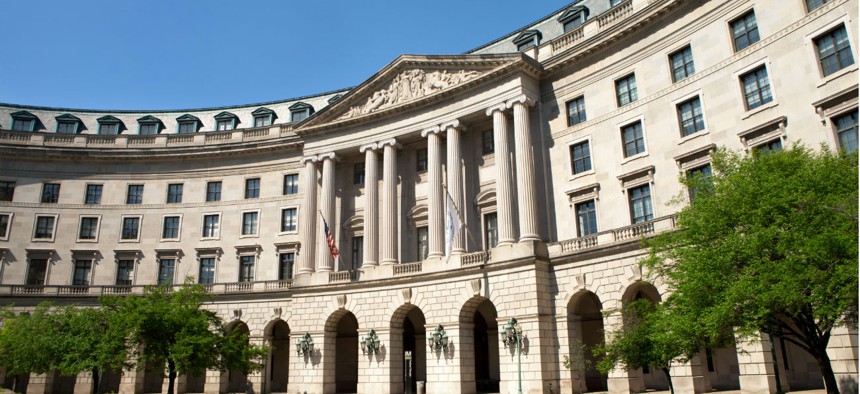
By Mark Van Scyoc / Shutterstock.com
EPA Unilaterally Imposes New Union Contract Slashing Telework, Easing Firing
Labor group plans a legal fight against the decision.
The Environmental Protection Agency has cut off negotiations with its primary union and informed the labor group it will unilaterally implement a new contract, stripping away many of the rights and privileges employees currently enjoy and setting up yet another legal battle between the Trump administration and the federal workforce.
The new, one-sided agreement is set to go into effect on July 8 and severely limit telework, evict union representatives from agency office space and restrict employees from filing a grievance over disciplinary actions, among other changes. EPA blamed the American Federation of Government Employees for the unilateral implementation of the new contract, telling the union its refusal to open up the entire agreement to negotiation required the agency to take action on its own.
The dispute follows an ongoing pattern in the Trump administration, which has frequently butted heads with unions across government. Representatives of employees at the departments of Education, Health and Human Services and Veterans Affairs are all fighting their agencies' efforts to curtail negotiations or otherwise limit unions’ power. Trump previously attempted to cripple federal employee unions through an executive order, but a federal judge largely struck it down. The administration is currently appealing that decision.
A senior career EPA official told Government Executive the negotiations trace back to 2010, when the agency first came to AFGE to reopen its 2007 agreement. After a series of back and forth discussion, and what the official described as "delay tactics" by AFGE, EPA filed an unfair labor practice with the Federal Labor Relations Authority in late 2016. The two sides agreed to restart negotiations as part of a settlement agreement reached in 2017, but they could not agree on ground rules. While EPA characterized the recent spat as part of an ongoing nine-year dispute, AFGE suggested the provisions of the new contract mirror those contained in Trump's executive orders.
Under the new contract, employees can only telework once per week. All staff must report to their duty stations four days per week, so anyone on an alternative work schedule would be effectively barred from teleworking. The agreement would change EPA’s performance assessment for bargaining unit employees, making it easier to place them on a performance improvement plan and subsequently fire them.
Currently, employees facing an adverse action can challenge that decision through the union grievance process. The contract is set to eliminate that practice, as well as ending grievance for progress reviews, telework decisions, work schedules and other issues. EPA is planning to force union representatives out of their agency offices and meeting spaces within 30 days of the contract taking effect.
The EPA official said the provisions would increase efficiency at the agency, as it would streamline several different avenues to challenge an adverse action and help reduce EPA's use of office space. AFGE President J. David Cox, however, accused EPA of "trampling on federal employees' rights and ignoring the law."
EPA is also planning to drastically scale back the use of official time, which allows agency employees to conduct representational activities on behalf of the union members while receiving taxpayer-funded salaries. Employees will now have to spend at least 75% of their time conducting official agency business and they cannot use official time to prepare grievances or cases before the Merit Systems Protection Board and the Equal Employment Opportunity Commission. Currently, about a dozen EPA employees work full time on official time.
AFGE has already filed an unfair labor practice with the FLRA to reverse EPA’s decision. Gary Morton, president of the AFGE council that represents EPA employees, warned members the union may not get relief before the July 8 deadline and instructed them to comply with the contract’s “sweeping changes.” AFGE would continue to pursue a resolution in court, he said.
In an email to union officials, Bob Coomber, senior labor attorney in EPA’s Labor and Employee Relations Division, said the agency first informed AFGE last year of its intentions to renegotiate its master collective bargaining agreement following the 2017 settlement. AFGE said only five articles of the contract were up for negotiation, while EPA maintained the entire agreement should be subject to bargaining.
“With the union’s most recent statement regarding the scope of negotiations and its statement that, ‘We decline to negotiate new ground rules,’ which would have been a predicate to negotiations over a new contract, the agency provides the union with the attached to replace in its entirety the 2007 MCBA,” Coomber said.
Typically, labor and management head to mediation if they cannot come to an agreement on the ground rules for negotiations. The career EPA official said the agency felt that because the contract was 12 years old, the entire agreement had to be reevaluated.
In a statement, Morton said the changes would negatively impact EPA's mission and vowed to continue pushing back.
“The administration is hijacking the collective bargaining process to enforce illegal provisions that will make it harder for EPA employees to do their jobs,” Morton said. “We are going to do everything we can to fight this injustice and defend EPA employees from these baseless attacks on their rights and jobs.”
The senior official at EPA acknowledged that AFGE has multiple options forward and suggested the agency was still open to a compromise.
"We issued the contract," the official said. "The ball is now in AFGE's court. But we’re willing to negotiate in good faith."
Tim Whitehouse, executive director of the advocacy group Public Employees for Environmental Responsibility, said the new agreement could make it easier for EPA to politicize the agency.
“In the Trump world, there is no bargaining, only ultimatums,” said Whitehouse, a former EPA enforcement attorney. “Under these rules, important safeguards against political purges within the civil service would be removed.”
This story has been updated with additional comments from both EPA and AFGE.







